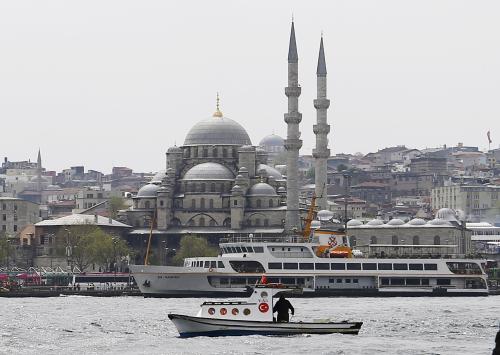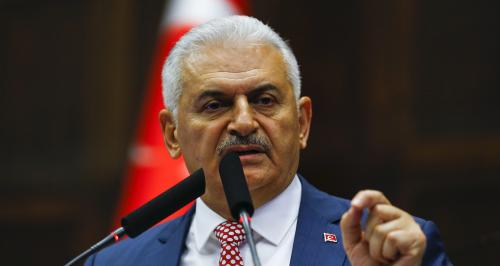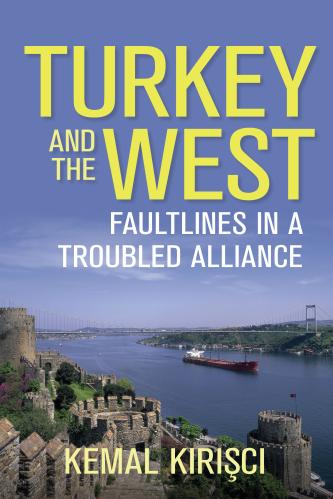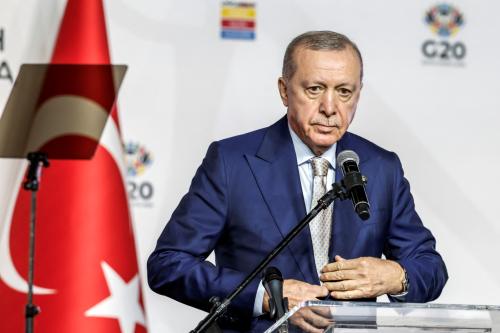Chairman Corker, Ranking Member Cardin, distinguished members of the committee, thank you for the invitation to discuss recent developments in Turkey and the implications for our bilateral relationship. Although Turkey can be a complicated and challenging NATO ally, it remains strategically important to the United States and requires our continued engagement.
A year after the attempted coup, Turkish society remains deeply traumatized by the events of July 15, 2016 and its aftermath as well as regional risks to the country’s peace and security. There is little western anchor given tense relations with the United States and the European Union. Gulenists and separatist Kurds are seen as existential threats. Amidst an indefinite state of emergency, dissent is limited, press freedom has been curtailed, the opposition remains fractured, and the economy is weakening.
Many Turks were initially supportive of the government’s response to the coup attempt, which was neither expected nor desired. There was frustration with the perceived delay in western condemnation of the putsch amidst presumed ambivalence about the desirability of ousting the president. There remains consternation that the man accused of fomenting the coup, Muslim cleric Fetullah Gülen, is living in self-imposed exile in Pennsylvania. While Ankara has given the US government boxes of documents, it has yet to provide sufficient evidence to persuade a judge of probable cause that would warrant extradition.
Unfortunately, actions by the Turkish government have begun to weaken the democracy that it purports to protect. Initial efforts to arrest suspected coup plotters and affiliated Gulenists have morphed into an apparent witch-hunt against all political opponents. Recent reports note at least 150,000 people sacked from government and academia, 50,000 or more jailed for alleged collusion, as well as over 150 journalists behind bars. When I visited Turkey this summer for the first time since the putsch attempt, the climate of anxiety was palpable. There is a vulnerable state apparatus and a paranoid society. The state of emergency has had a chilling effect on public opposition, as it allows individuals to be held in pre-trial detention for 30 days without charge. The government’s elastic definition of “terrorism” alters the bounds of what is politically permissible; this has narrowed space for dissent, shrunk press freedom, and diminished confidence in state institutions. Americans (as well as Europeans) are getting caught in this web, as evidenced by the imprisonment of pastor Andrew Brunson on hollow terrorism accusations.
The domestic situation is unlikely to improve in the near future. Against the backdrop of the failed coup, Turkish citizens went to the polls last April to determine whether to provide sweeping new powers to the president. While official results claimed 51 percent of voters supported the reforms, the OSCE cited a “restrictive” campaign framework and there were widespread allegations of fraud. Recep Tayyip Erdoğan, who just began his fourth year as president, is now focused on preparations for parliamentary and presidential elections in 2019. He recently acknowledged these elections will be “difficult,” presumably as he recognizes disenchantment among his base given excessive post-coup purges, economic challenges (as pocketbook politics affect his middle class supporters), and claims of government corruption. Meanwhile, opposition parties have struggled to provide an effective counterweight. The pro-Kurdish People’s Democratic Party (HDP) is particularly hamstrung, as its leader Selahattin Demirtaş, 13 MPs, and dozens of elected mayors are imprisoned on spurious terrorism charges.
Despite these challenges, Turkish civil society is not dead. The country is deeply divided between supporters and opponents of Erdoğan, as evidenced by the 48 percent of the electorate (at a minimum) who voted against the constitutional changes. In June, the government – led by the conservative Justice and Development Party (AKP) – withdrew a proposal to allow developers to build industrial facilities in olive groves following public opposition. This is a small but not insignificant legislative victory. Later that month, Kemal Kiliçdaroğlu – leader of the social democratic People’s Republic Party (CHP) – led a 280-mile “march for justice” from Ankara to Istanbul to protest arrests (including of a CHP MP) as part of the postcoup crackdown. Hundreds of thousands of protesters joined his rally in Istanbul, the largest public demonstration since the Gezi Park protests of 2013. While not a mass uprising, it demonstrated Turks’ continued willingness to demand justice and government accountability.
In addition to domestic challenges, Turkey sits in a turbulent neighborhood. It has been particularly affected by the civil war and battle against the Islamic State (ISIS) in Syria. These conflicts flooded Turkey with over 3 million refugees, created complex dynamics with Russia and Iran, contributed to several large terrorist attacks, and further complicated engagement with the PKK (the Kurdistan Worker’s Party, a US-designated terrorist organization that has fought the Turkish state for decades).
Different priorities in Syria have contributed to tension in US-Turkey relations. Erdoğan initially focused on the removal of Syrian President Bashar Al-Assad, which resulted in lax enforcement of border controls despite American and European calls to stop flows of foreign fighters. The US was reluctant to engage in the civil war, but took aggressive action to counter the Islamic State. Turkey initially felt less threatened by the rise of ISIS, a view that changed after an attack by an Islamic State suicide bomber in southern Turkey in July 2015. Weeks later Ankara opened Incirlik airbase to US and coalition forces conducting counter-ISIS missions.
US special operators sought ground forces with whom to partner. They found a faction of Syrian Kurds, the YPG (the People’s Protection Units), to be the most organized and militarily effective fighters. They provided logistical and air support to help the YPG take territory from ISIS. Turkey vehemently objected given the YPG’s links to the PKK. Their fears aren’t unfounded: in 2016 alone, the PKK conducted multiple mass-casualty attacks in Ankara and Istanbul that killed far more Turks than did ISIS attacks. Syria-related conflict also contributed to the breakdown of Turkey’s 36-month ceasefire with the PKK.
Amidst protracted and ultimately unsuccessful US-Turkey negotiations about the viability of alternative Sunni forces, Turkey’s top priority became preventing the YPG from achieving its political objective: the connection of three northern Syrian cantons into a single autonomous region, which Ankara feared could result in an independence bid or be used as a staging area for attacks on Turkey. This bilateral dispute came to a head in June 2017, when American officials informed Ankara on the eve of President Erdoğan’s visit to Washington that the US had decided to arm the YPG for the battle against ISIS in Raqqa. While Erdoğan begrudgingly accepted the decision, Turkey signaled its readiness to protect its redlines days later by firing on YPG forces allegedly targeting Turkish-backed opposition fighters. This Gordian knot will remain a sticking point in US-Turkey relations, as thorny decisions remain about security and governance arrangements in post-ISIS Syria.
Given the precipitous decline in Turkey’s rule of law and the complicated diplomacy often required to reach agreement on shared challenges, it may appear tempting to walk away from the relationship. The European Union has begun its own debate, with the European Parliament calling to freeze accession talks, Enlargement Commissioner Johannes Hahn recommending a “new approach,” and German Chancellor Angela Merkel threatening not to update the Turkey/EU custom union.
While now is an appropriate moment to assess and recalibrate, it would be a mistake to curtail relations with Turkey. It remains an important bridge between Europe and the Middle East. There is utility in continued efforts to keep Turkey anchored in a Euro-Atlantic community based on shared values, even if Ankara doesn’t always live up to those values. There are also real risks from a failed relationship, including setbacks to US efforts to fight the Islamic State (as well as future radical groups that grow in unstable environments), a weakened ability to stem refugee flows into Europe, and the degradation of one of the region’s most successful economies. Furthermore, Turkey’s foreign policy orientation matters to the west. If the EU and US abandon Turkey, Ankara will seek partners elsewhere – as demonstrated by its recent interactions with Russia and Iran.
As a starting point, Washington needs to take seriously Turkish security concerns. While the US cannot give Turkey everything it demands, sustained discussion of its perceived threats builds trust and provides reassurance. On Gülen, the US government has made clear that his extradition is a matter for the courts. However, US officials should continue engaging with Turkish counterparts to demonstrate the sincerity with which they are reviewing evidence and seek ways to help bring those responsible to justice. That said, Turkey should not employ judicial blackmail by detaining American citizens in the hopes of using them as leverage in their claims.
Similarly, the US and Turkey should continue their high-level dialogue on Syria and Kurdish issues. The late August trip by Defense Secretary James Mattis was a helpful visit by all accounts. Reports suggest he promised transparency in US cooperation with the YPG, as well as further assistance in Turkey’s fight against the PKK. More broadly, reconciliation between Turkey and the PKK is the only solution to this overarching regional problem. Washington should continue pressing Ankara to resume peace talks, offering American support as desired. In addition, the US should work with Turkey and other regional allies to develop a long-term political strategy for Syria; it will be particularly important to understand Turkish plans with Russia and Iran. The US should make clear to the YPG its opposition to Syrian Kurdish independence, as well as the need for the group to cut operational ties with the PKK, fulfill its long-ignored promise to withdraw east of the Euphrates River (i.e., not connect the cantons), allow displaced Sunni civilians to return home, and govern in an inclusive manner. In return, Ankara will need to accept some YPG participation in discussions about Syria’s political future and the movement of Kurdish civilians between cantons.
Beyond Syria, there are numerous regional issues where the US and Turkey share common interests and can work together. Both countries have concerns about the planned independence referendum in Iraqi Kurdistan later this month, and they will need to manage the potential fall-out if it proceeds. Both have a vested interest in seeing a resolution to the dispute between Qatar and its Gulf neighbors. As the US considers sending more troops to Afghanistan, it is worth remembering Turkey is the only NATO country that increased its troop presence following the Alliance’s 2015 transition from a combat to a support mission. Within the Mediterranean, Turkey has the potential to become a regional energy hub and remains a critical player in resolving the Cyprus conflict.
Finally, rule of law must remain on the bilateral agenda. Although public rebuke isn’t always the most effective way to motivate political change (especially in a country quick to anti-American sentiment), Turkish citizens who value good governance are looking for moral support. More critically, senior American officials must stress the importance of rule of law in private conversations with Turkish interlocutors. Reports suggest President Trump did not raise such concerns during his Oval Office meeting with President Erdoğan, which gives the unfortunate signal the US no longer cares about the state of Turkish democracy.
Furthermore, efforts should be made to expand the breadth of US-Turkey relations. It is unhelpful to personalize bilateral ties in interactions between leaders, while there are limits to a relationship rooted primarily in military cooperation. There is scope to expand people to people ties, which would encourage the half of Turkish society that fears being abandoned by its long-time friends. In particular, the US should reinvigorate efforts to expand trade. This would benefit US companies eager to invest in the Turkish market. It could also motivate reforms to help stabilize the Turkish economy; for example, the indefinite state of emergency remains a significant drag on foreign investment.
In closing, there are strains in our bilateral relationship, divergent views on some important issues, and serious concerns about Ankara’s commitment to rule of law and human rights. At the same time, the only people who benefit from the US curbing ties significantly are those who don’t want Turkey facing west. Continued engagement – including honest discussion with the government and expanded outreach to business and civil society – remains the only way forward.
The Brookings Institution is committed to quality, independence, and impact.
We are supported by a diverse array of funders. In line with our values and policies, each Brookings publication represents the sole views of its author(s).








Commentary
TestimonyPriorities and challenges in the U.S.-Turkey relationship
September 6, 2017